10 Marigold Companion Plants for a Pest-Free Garden
Grow these marigold companion plants to attract pollinators and repel pests.
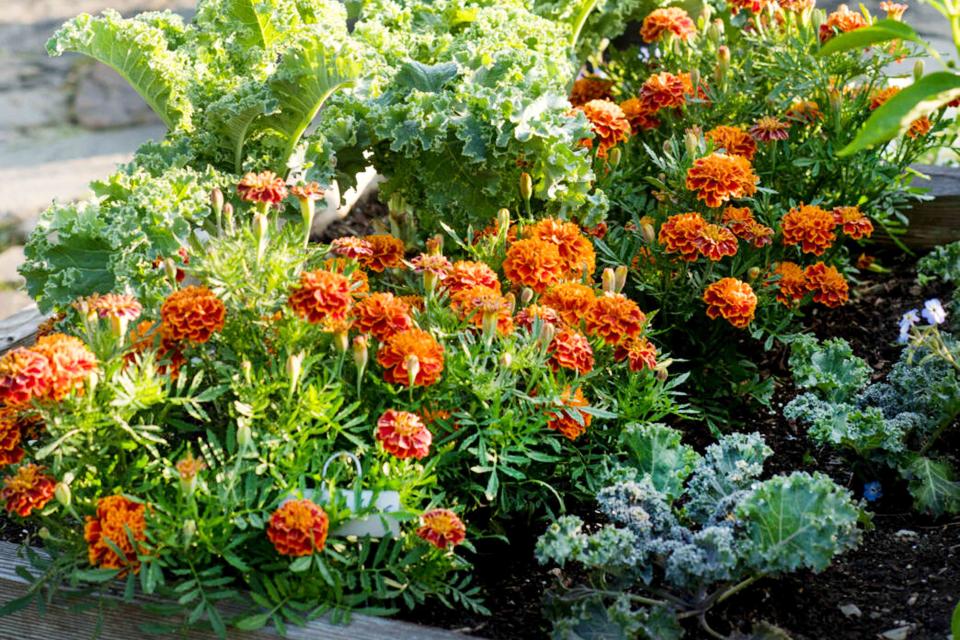
Kindra Clineff
While there are many pest-repelling companion plants to try in vegetable gardens, marigolds are at the top of the list for a good reason. Growing marigold companion plants can attract beneficial insects like hoverflies to garden beds, but marigolds also act as trap crops for pest insects and deter other bugs, deer and rabbits. When growing marigolds in your backyard veggie plot or raised bed, these companion plants will gain the most pest protection from these flowers.
Related: The Best Types of Marigolds for Colorful Flowers and Keeping Bugs Away
Potatoes
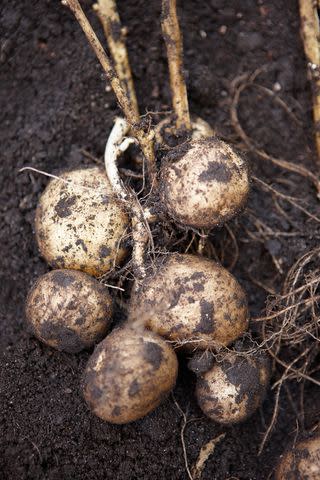
Marty Baldwin
Potatoes are relatively easy to grow, but they can be plagued by pests like Colorado potato beetles from time to time. While a small population of potato beetles won’t do much damage, large infestations can defoliate potato stems, weaken plants, and make potatoes produce fewer spuds. Luckily, marigolds are known to deter a variety of beetles, including potato beetles, and they help to distract aphids from potato plants too.
Squash and Pumpkins
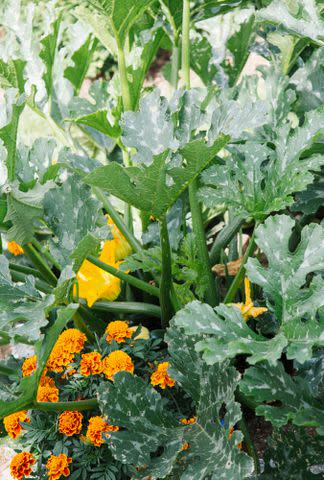
Helen Norman
As any gardener can tell you, squash bugs are one of the hardest pests to eradicate in vegetable gardens and they’re particularly drawn to plants in the cucurbit family, like squash and pumpkins. Once they arrive in gardens, squash bugs congregate in large groups and significant infestations can cause plant stress, wilting, and vine collapse. The good news is that marigolds can help with squash bugs too, but you’ll need to seek out African marigolds to get the best results.
Brassicas
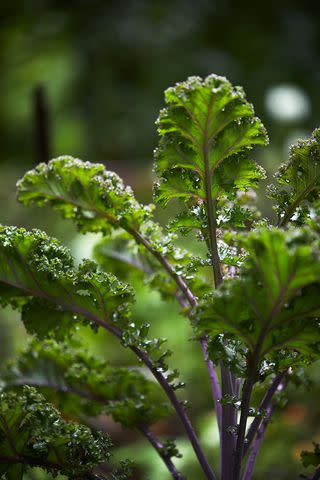
Brie Williams
Rabbits love nibbling on leafy greens and they’re often drawn to brassica plants, like kale and broccoli. But if you interplant marigolds among your brassicas, you may be able to thwart these furry garden visitors and protect your vegetable crops from damage. Even better, marigolds repel cabbage maggots and nematodes and their flowers entice predatory insects to garden beds to keep pests in line.
Related: 10 Best Companion Plants for Kale
Cucumbers

Cucumbers attract an assortment of pests, but marigolds can keep many of those insects at bay. Once they’re done feasting on squash plants, squash bugs may visit cucumber vines, but they are less likely to creep in if there are marigolds growing nearby. Marigolds also help to distract beetles away from veggie plants, including the most infamous cucumber pest: the cucumber beetle.
Herbs
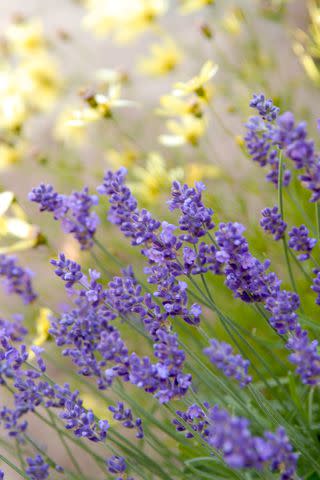
Matthew Benson
Herbs like lavender, sage, thyme, and basil get along with most common veggies and their simple growing needs make them perfect marigold companion plants. Beyond that, scented herbs are also ideal for garden pest and disease control, and growing them side by side with marigolds can make pests even less likely to visit your vegetable garden. If you want to make your herbs even more attractive to ladybugs, lacewings, and other beneficial insects, allow your herb plants to flower.
Tomatoes

Blaine Moats
Brightly colored marigold flowers add pizzazz to drab veggie beds while gardeners await mouth-watering harvests of tomatoes and other crops. But marigolds also directly benefit tomatoes by releasing limonene, which repels damaging whiteflies. While tomatoes are typically self-pollinating plants, growing marigolds nearby can also boost pollinator activity and make plants produce more fruit.
Related: How to Pollinate Tomatoes by Hand to Boost Your Harvest
Melons
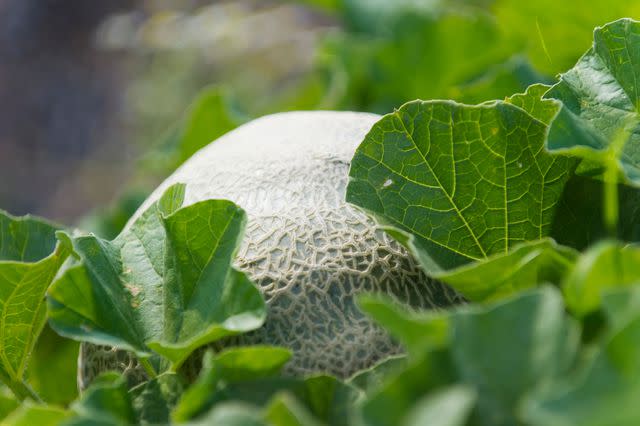
Robert Cardillo
Cantaloupes, honeydews, watermelons, and other melons all belong to the cucurbit family, which means they’re vulnerable to many of the same pests as cucumbers, squash, and pumpkins. Just like squash plants, melons can be targeted by destructive squash bugs and cucumber beetles, but using them as marigold companion plants can deter these troublesome pests. On top of that, marigold blooms will entice pollinators to visit melon flowers, increasing pollination rates and harvest yields.
Peppers
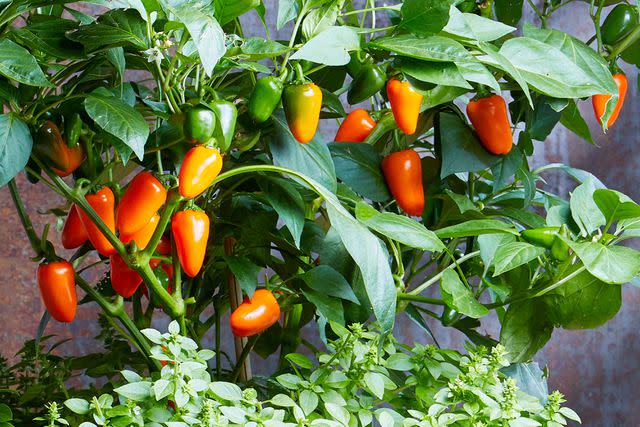
Carson Downing
Peppers and marigolds both thrive in bright sun and well-drained soil, so it’s no surprise that they grow well together in pots or larger veggie beds. Brightly colored marigold flowers complement the shades of developing bell and hot pepper fruit, but peppers also benefit from marigolds’ pest-repelling properties. If you’re growing peppers in a small space but still want to use marigolds to your advantage, try growing dwarf marigolds, which only grow about 6 inches tall.
Carrots
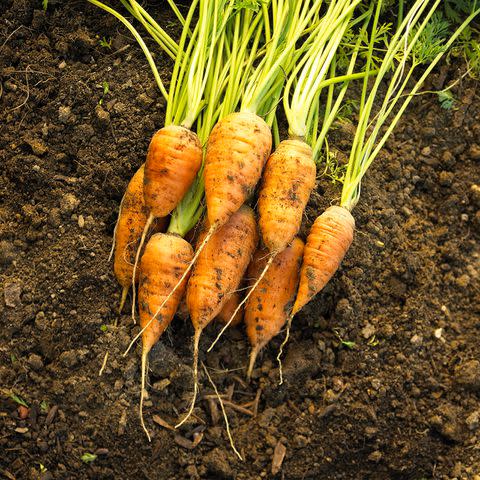
Nematodes cause problems for a wide variety of food crops, including pea plants, tomatoes, and melons. But nematodes are particularly problematic for carrots since they specifically target carrot roots, the part of the plant people most want to eat. Once they invade, nematodes cause carrots to grow into distorted shapes and develop unsightly galls and blemishes. However, African and French marigolds produce substances that kill nematodes naturally.
Eggplants

Carson Downing
Like carrots, eggplants are also vulnerable to nematodes, but companion planting with marigolds can shield eggplants from nematode damage. What’s more, interplanting eggplants with marigolds can attract more pollinators to your garden, which will increase pollination rates and improve eggplant harvests too. Although eggplants are self-pollinating crops, studies have found that eggplants produce
larger fruit when they’re pollinated by insects.
For more Better Homes & Gardens news, make sure to sign up for our newsletter!
Read the original article on Better Homes & Gardens.

